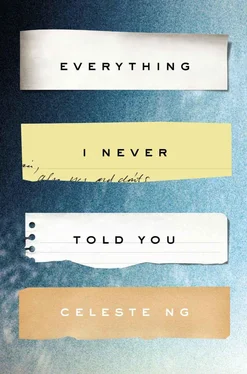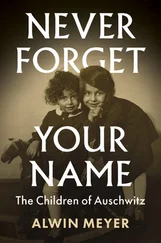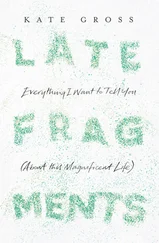Was she sad? She was more surprised than anything: surprised at how familiar her mother’s house still felt. Even after eight years, she still remembered exactly how to wiggle the key — down and to the left — to get the lock to open; she still remembered the screen door that slowly closed itself with a hiss. The light in the foyer had burned out and the heavy curtains in the living room were closed, but her feet moved by instinct despite the dark: years of rehearsal had taught her the dance step around the armchair and the ottoman to the table beside the sofa. Her fingers caught the ribbed switch of the lamp on the first try. It could have been her house.
When the light came on, she saw the same shabby furniture she’d grown up with, the same pale lilac wallpaper with a grain, like silk. The same china cabinet full of her mother’s dolls, whose unblinking eyes gave her the same cold tingle on the back of her neck. On the mantel, the same photographs of her as a child. All the things that she needed to clear away. Was she sad? No, after the daylong drive, only tired. “Many people find this job overwhelming,” the undertaker told her the next morning. He gave her the number of a cleaning company that specialized in making houses ready to sell. Ghouls, Marilyn thought. What a job, clearing the homes of the dead, piling whole lives into garbage bins and lugging them to the curb.
“Thank you,” she said, lifting her chin. “I’d rather take care of it myself.”
But when she tried to sort her mother’s things, she could find nothing she wanted to keep. Her mother’s gold ring, her twelve settings of china, the pearl bracelet from Marilyn’s father: mementos of an ill-fated wedding day. Her demure sweater sets and pencil skirts, the gloves and hat-boxed hats: relics of a corseted existence that Marilyn had always pitied. Her mother had loved her doll collection, but their faces were blank as chalk, white china masks under horsehair wigs. Little strangers with cold stares. Marilyn leafed through photo albums for a picture of herself with her mother and couldn’t find one. Only Marilyn in kindergarten pigtails; Marilyn in third grade with a missing front tooth; Marilyn at a school party, a paper crown on her head. Marilyn in high school in front of the Christmas tree in a precious Kodachrome. Three photo albums of Marilyn and not a single shot of her mother. As if her mother had never been there.
Was she sad? How could she miss her mother when her mother was nowhere to be found?
And then, in the kitchen, she discovered her mother’s Betty Crocker cookbook, the spine cracking and mended, twice, with Scotch tape. On the first page of the cookie section, a deliberate line in the margin of the introduction, the kind she herself had made in college to mark an important passage. It was no recipe. Always cookies in the cookie jar! the paragraph read. Is there a happier symbol of a friendly house? That was all. Her mother had felt the need to highlight this. Marilyn glanced at the cow-shaped cookie jar on the counter and tried to picture the bottom. The more she thought about it, the less sure she was that she had ever seen it.
She flipped through the other chapters, looking for more pencil lines. In “Pies,” she found another: If you care about pleasing a man — bake a pie. But make sure it’s a perfect pie. Pity the man who has never come home to a pumpkin or custard pie. Under “Basic Eggs”: The man you marry will know the way he likes his eggs. And chances are he’ll be fussy about them. So it behooves a good wife to know how to make an egg behave in six basic ways. She imagined her mother touching the pencil tip to her tongue, then drawing a careful dark mark down the margin so that she would remember.
You’ll find your skill with a salad makes its own contribution to the quality of life in your house.
Does anything make you feel so pleased with yourself as baking bread?
Betty’s pickles! Aunt Alice’s peach conserve! Mary’s mint relish! Is there anything that gives you a deeper sense of satisfaction than a row of shining jars and glasses standing on your shelf?
Marilyn looked at Betty Crocker’s portrait on the back cover of the cookbook, the faint streaks of gray at her temples, the hair that curled back from her forehead, as if pushed back by the arch of her eyebrow. For a second, it resembled her mother. Is there anything that gives you a deeper sense of satisfaction? Certainly her mother would have said no, no, no. She thought with sharp and painful pity of her mother, who had planned on a golden, vanilla-scented life but ended up alone, trapped like a fly in this small and sad and empty house, this small and sad and empty life, her daughter gone, no trace of herself left except these pencil-marked dreams. Was she sad? She was angry. Furious at the smallness of her mother’s life. This, she thought fiercely, touching the cookbook’s cover. This is all I need to remember about her. This is all I want to keep.
The next morning, she called the housecleaning company the undertaker had recommended. The two men who arrived at her door wore blue uniforms, like janitors. They were clean-shaven and courteous; they looked at her with sympathy but said nothing about “your loss.” With the efficiency of movers they packed dolls and dishes and clothes into cartons. They swaddled furniture in quilted pads and trundled it to the truck. Where did it go, Marilyn wondered, cradling the cookbook — the mattresses, the photographs, the emptied-out bookshelves? The same place people went when they died, where everything went: on, away, out of your life.
By dinnertime, the men had emptied the entire house. One of them tipped his hat to Marilyn; the other gave her a polite little nod. Then they stepped out onto the stoop, and the truck’s engine started outside. She moved from room to room, the cookbook tucked under her arm, checking that nothing had been left behind, but the men had been thorough. Her old room was hardly recognizable with the pictures peeled from its walls. The only signs of her time there were the thumbtack holes in the wallpaper, invisible unless you knew where to look. It could have been a stranger’s house. Through the open curtains she could see nothing, only panes of dusk and her face faintly reflected back to her in the glow of the ceiling light. On her way out, she paused in the living room, where the carpet was pockmarked with the ghosts of chair feet, and studied the mantel, now a clean line under a stretch of bare wall.
As she pulled onto the highway, heading toward Ohio and home, those empty rooms kept rising in her mind. She swallowed uneasily, pushing the thought aside, and pressed the gas pedal harder.
Outside Charlottesville, flecks of rain appeared on the windows. Halfway across West Virginia the rain grew heavy, sheeting the windshield. Marilyn pulled to the roadside and turned off the car, and the wipers stopped midsweep, two slashes across the glass. It was past one o’clock in the morning and no one else was on the road: no taillights on the horizon, no headlights in the rearview, only farmland stretching out on either side. She snapped off her own lights and leaned back against the headrest. How good the rain would feel, like crying all over her body.
She thought again of the empty house, a lifetime of possessions now bound for the thrift shop, or the garbage dump. Her mother’s clothes on some stranger’s body, her ring circling some stranger’s finger. Only the cookbook, beside her at the other end of the front seat, had survived. That was the only thing worth keeping, Marilyn reminded herself, the only place in the house there was any trace of her.
It struck her then, as if someone had said it aloud: her mother was dead, and the only thing worth remembering about her, in the end, was that she had cooked. Marilyn thought uneasily of her own life, of hours spent making breakfasts, serving dinners, packing lunches into neat paper bags. How was it possible to spend so many hours spreading peanut butter across bread? How was it possible to spend so many hours cooking eggs? Sunny-side up for James. Hard-boiled for Nath. Scrambled for Lydia. It behooves a good wife to know how to make an egg behave in six basic ways. Was she sad? Yes. She was sad. About the eggs. About everything.
Читать дальше












